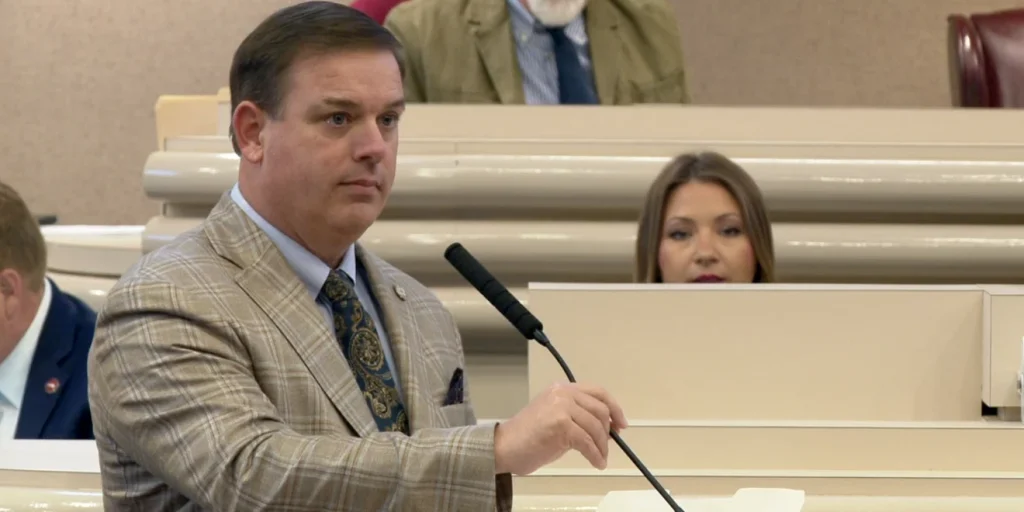On Thursday, the Alabama House of Representatives passed legislation with bipartisan support that will require teachers to post the curriculum of their classes online so that parents can be aware of what their child is learning and being presented.
The “Parents’ Right to Know” bill is sponsored by Senate President Pro Tempore Greg Reed (R-Jasper). It was carried in the House of Representatives by Rep. Matt Woods (R-Jasper).
The bill would also require each teacher, upon request, to allow the parent of a child enrolled in the class to examine all instructional and supplemental materials and books available to students in the classroom.
“This bill requires that the curricula that will be used in each classroom of public K-12 schools be posted on the school website at the beginning of each calendar year, or within thirty days after a new or revised curriculum is adopted,” said Rep. Woods.
“The posting will be verified by the local superintendent of education and the local board of education. The goal for this bill is to provide parents and guardians with an easily accessible way to see their child’s curricula in hopes to have better engagement with their child’s education. This bill provides transparency and communication, which are both beneficial component for student success.”
There is a complaint process in the bill for a parent that has a concern about something that is in the curriculum.
“I have got two young daughters, so we are thinking about education. We are taking a hard look at it,” said Rep. James Lomax (R-Huntsville).
“I think this is a no-nonsense, commonsense bill. If you look at it, parents should know the curriculum that their kids are learning. They get progress report cards so they know how they are progressing — so, it would be nice to know what they are learning — what they are progressing on. This is good for the parents. It is also good for the teachers. You are working on a common trend so both parties know what is out there and the material that they are learning, so I want to thank you for bringing it. I am proud to vote for it,” Rep. Lomax said.
“I have shared with you how important educational transparency is I believe, and this bill does provide a step a movement toward the process of parents being able to guide the education of their children,” said Rep. Arnold Mooney (R-Indian Springs).
“Particularly in our public schools it provides them an opportunity for transparency they have not had before so the ability to parents to do this and ask questions about what is being taught to our children is vital in the process I believe that provides us young leaders versus people who are apathetic and looking at the voter turnout of the election we just had, it is amazing how low that turnout is among young people up to age 35 or so.”
“I don’t see a necessity for it if you don’t like how little Mary or how little Jimmy or little Alley are being educated – teach them at home,” said Rep. John Rogers (D-Birmingham). “Most parents are not educators.”
State Rep. Kenneth Paschal (R-Pelham) brought an amendment to the bill that protected the privacy of a parent or guardian making a complaint on the behalf of a child.
SB48 passed the House 99 to 3 with only Democratic Reps. Mary Moore (D-Birmingham), John Rogers, and Thomas Jackson (D-Thomasville) voting against.
The Alabama Republican Party released a statement praising this legislation.
“SB48 champions parental rights through greater transparency in school curricula. This legislation ensures that parents have unrestricted access to their children’s course of study and related materials, allowing them to be in the driver’s seat of their child’s education.”
Because the bill was altered by the House, it goes back to the Senate for their review of the House’s changes. The bill’s author, State Sen. Greg Reed, says Alabama schools do an “incredible job pouring into our young students.”
“This bill provides an opportunity for educators and parents to come together and be in lockstep about what is going on in our classrooms. We want educators to continue being able to do their jobs well, and we want parents to be as invested in their children’s educations as possible,” Reed said upon the bill’s Senate passage.
“A large portion of schools across Alabama already practice this policy, and implementing similar measures uniformly statewide will help build collaboration between schools and families across our state.”
To connect with the author of this story, or to comment, email [email protected]













